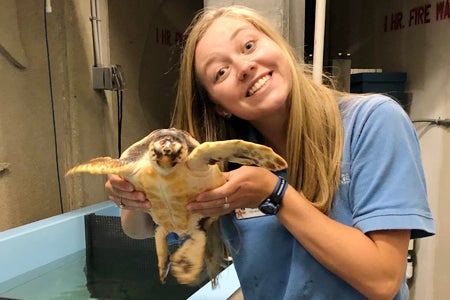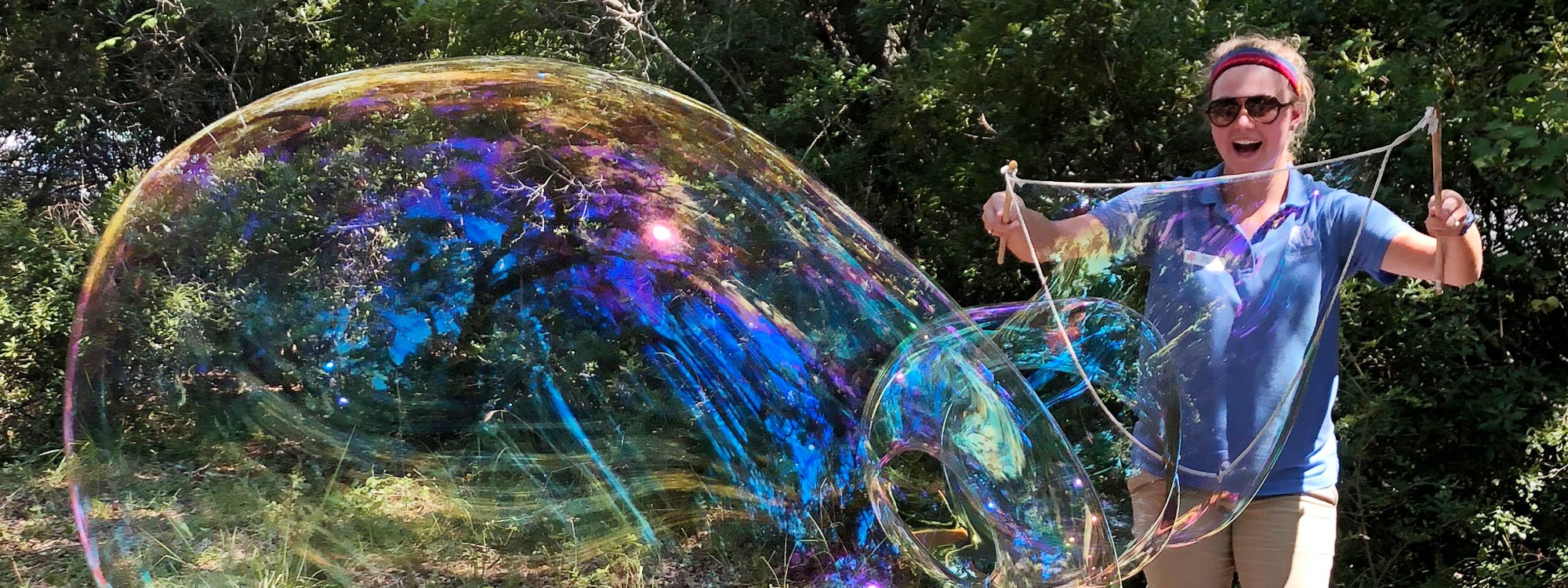Neurobiology to Marine Biology
Undergraduate researcher plans to meld interests
Between hosting interactive exhibits and hand feeding aquatic animals as part of her internship at the North Carolina Aquarium at Fort Fisher, rising East Carolina University sophomore Emily Scott has one specific interest on her mind.
Neurobiology.
“I’ve been interested for a while in neuroscience and genetics, specifically neurodegenerative diseases,” Scott said. “When I was a kid, I was interested in marine biology, but as I got older, I shifted from that interest to neurobiology.”
Scott said her attraction to neurobiology and neurodegenerative diseases began after her aunt was diagnosed with ALS – a progressive neurodegenerative disease that affects nerve cells in the brain and the spinal cord.
However, Scott’s internship with the aquarium as part of ECU’s Public Service internship program has made her rethink her future. The program provided a transformative experience for the young researcher, forcing her to reexamine a passion that’s flame has been reignited.

As part of her internship at the North Carolina Aquarium at Fort Fisher, Emily Scott handles aquatic animals like sea turtles.
“When I came here I thought I’d be an outcast,” Scott said. “It’s been the perfect place for me. I was on the fence about applying to the internship site because I wasn’t a marine biology major, but I’m so glad I did because it’s sparked an old interest in marine biology and created a new interest in marine conservation. I still have a passion for neurobiology, but it would be cool to somehow link the two in my future research.”
Scott’s no novice when it comes to conducting research. During her first semester, she worked on a research project with assistant biology professor Michael Brewer, documenting and measuring pigment in beetles to determine whether the insects could be considered different specifies based on their color differentiations.
Even though her upcoming semester will be filled with course work, she hopes to start on another project with Brewer as part of her biology thesis, which could combine her love of neuroscience and marine biology.
“I know that Dr. Brewer has some ideas in mind, and I hope that we can incorporate a marine biology element into it,” Scott said. “Whether it be actually working with animals or studying animal behavior, either one would be a great start.
“One of the ideas he mentioned was examining the behavior of crayfish under different stimuli,” she said. “Exploring how the crayfish act during isolation or intense social interaction … could help show how our actions affect the behaviors of other animals. That way we can study the neurology of animals and the psychological effects our interactions have on them.”
Casey Radley, the aquarium’s family program coordinator, said that many interns are shocked at the varied backgrounds of the aquarium’s staff members. From environmental science to communications, Radley said that the aquarium was the perfect home for someone with Scott’s diverse research background.
“It’s awesome that she comes in with a vast number of interests,” Radley said. “I feel like you can find a way to merge any interest with the ocean. Emily had the opportunity to talk with a lot of different people and learn a lot this summer about ocean life, ocean conservation and how to share that knowledge with the public. She’s been a huge lift to our programs here and I’m happy that we’ve renewed her interest in marine biology.”
Nature development
Along with her daily tasks of leading informative programs, interacting with aquarium visitors and feeding animals, Scott played a large role in developing the aquarium’s Nature Play Area. The project was funded by a grant through Disney and the Association of Zoos and Aquariums provided to the aquarium before Scott began her internship, but she’s played a pivotal role in its development.
“Because the Nature Play Area is new, it wasn’t like we were teaching Emily during its development,” Radley said. “She was critical during the planning process and I’d often find myself asking her a lot of questions like ‘What do you think of this?’ or ‘What should we do here?’ Emily has been really a partner in the program’s development all summer long.”
Scott said the Nature Play Area combines her love of nature and conservation.
“The area encourages children to play outside more, embrace nature and find fun things to do outside in the hope that when they grow up, they’ll have a connection with nature and want to preserve it because of that connection,” she said. “We’re currently designing a program specific to the area about the importance of nature and how we can help animals who are struggling because of habitat destruction.”
With her internship winding down, Scott said she’s thankful for the opportunity to investigate an area of study that played such an important role in her childhood.
“Growing up, I always wanted to be involved in marine biology and, even though I’ve shifted my career path since then, it’s been exciting to get to work in the field through my internship,” Scott said. “I haven’t had a lot of time of explore this discipline and I wouldn’t have been able to without the internship program.”
The SECU Public Service Fellows internship program is hosted by ECU’s Office of Community Engagement and Research. Visit the office online to learn more about the program. The North Carolina Aquarium at Fort Fisher is open daily from 9 a.m. to 5 p.m.
